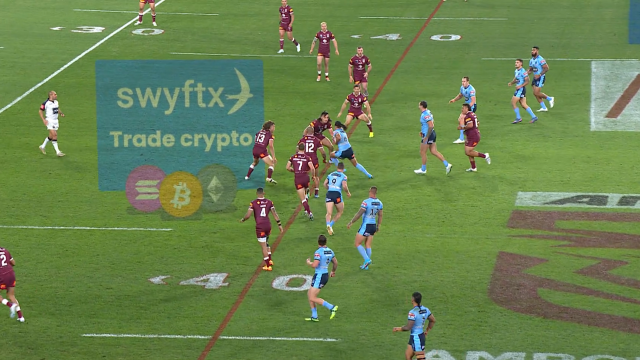Crypto has truly arrived in mainstream culture.
It’s no longer reserved for finance/technology news sites and even the most un-tech savvy of family members are likely asking if you’ve heard of this whole bitcoin thing.
As with any ‘scene’, you can avoid it if you want and if you’re keen to learn more, you head down a rabbit hole. But it becomes a little hard to escape when the logos of cryptocurrency exchanges are emblazoned on footy jerseys or plastered to the concrete barriers on a racetrack.
Many people associate cryptocurrency to a Ponzi scheme. Others swear by it being the future. But if it isn’t regulated like physical cash is, or like gambling websites are, are they allowed to advertise during sporting events in Australia?
Cryptocurrency and sport
At the Superbowl LVI in February, there was a number of cryptocurrency-adjacent advertisements. There was one featuring Larry David, another LeBron James and even a QR code that crashed Coinbase’s website within minutes. Staples Center in LA is now Crypto.com Arena, too.
As Boardroom TV makes it known in their expansive list, almost every Formula 1 team has an official sponsor hailing from the blockchain/crypto world, as well.
Cryptocurrency companies clearly have plenty of money to throw around these days. But it isn’t just in America.
Crypto partnerships in Aussie sport
In April, AFL announced was going to be bringing “the power of NFTs and the open metaverse to the AFL and AFLW”. It did this by launching the AFL Mint initiative. AFL chief Gillon McLachlan said the organisation would continue to bring fans new ways of engaging in Australian football. This all followed the league in January signing a five-year deal with Crypto.com, making the site the ‘official cryptocurrency exchange’ and ‘official cryptocurrency trading platform’ of AFL and AFLW. Swyftx also inked a three-year partnership with the NRL in February to become its exclusive crypto exchange partner.
It was hard to miss at State of Origin game one on Wednesday:

There’s also some silly stuff happening with NFTs and Cricket Australia and a tonne of partnerships I haven’t even touched on. The top and bottom of it is that sports as an industry has realised the potential that cryptocurrencies and blockchain tech can bring to further monetise fan engagement, attract sponsors and engage a global market.
While Swyftx logos might be splattered all over stadiums, gambling advertisements are aplenty in sport, too. So what’s the difference?
Gambling in Aussie sport
As an avid NRL fan, I can tell you ads for gambling sites are all too familiar. There’s also no shortage of cameos from betting ‘personalities’ on NRL-adjacent TV programs.
According to Nielsen Research, the gambling industry spent $271.3 million on advertising in Australia in 2020. This excludes (yep, does not include) social media, sponsorships and in-program content, such as during live sport broadcasts.
Despite all this, there’s actually rules in place. Ads for betting products are not permitted during TV programs classified G or lower from 6 am to 8.30 am and 4 pm to 7 pm, or in programs directed at children between 5 am and 8.30 pm.
Until 2018, however, these restrictions excluded sport broadcasts.
As On 30 March 2018, bans on gambling ads during broadcasts of live sport were introduced between 5 am and 8.30 pm.
On 28 September 2018, new complementary rules were also implemented to restrict gambling advertising during online streaming of live sport between 5 am and 8.30 pm.
While you might draw distinction between crypto investing and gambling, none of this applies to the mostly unregulated cryptocurrency industry.
Crypto advertisement regulation
Gizmodo Australia reached out to the ACMA, asking if their role in monitoring/regulating gambling advertisements in sporting broadcasts extended to crypto. The short answer was no, but here’s what they had to say:
The ACMA’s regulatory role includes oversight of industry codes and other rules governing content that is broadcast on television and radio. The rules only apply to advertising at sporting events if the advertising is part of the broadcast. The rules include restrictions on broadcasting of gambling advertising during live sporting events but do not extend to advertising of crypto currencies.
It’s not the responsibility of Ad Standards, either. Ad Standards told Gizmodo Australia it does not administer any codes specifically for cryptocurrency. It would, however, consider any complaints about the content of cryptocurrency ads under the existing advertising industry codes that cover issues such as: the discrimination or vilification of people; exploitative or degrading sexual imagery; offensive language; sex, sexuality or nudity; violence; health and safety; distinguishable advertising or misleading environmental claims.
The Australian Securities & Investments Commission (ASIC) has published regulatory guidance on crypto-assets including in relation to the advertising of crypto-assets such as cryptocurrency. ASIC points to the Australian Competition and Consumer Commission’s (ACCC) ‘advertising and selling guide’
Under this, conduct that may be misleading or deceptive to consumers will be dealt with. An example of ‘misleading or deceptive conduct’ is advertising that the crypto-assets (such as coins or tokens) or ICO offered are not a financial product, when in fact they are. Or portraying a celebrity as endorsing the product or service if they in fact don’t.
Basically, if a crypto-adjacent company makes misleading claim, the ACCC has your back. But they don’t have any jurisdiction if the crypto company that’s advertising is doing nothing wrong.
With nothing stopping cryptocurrency exchanges from jumping on board as sponsors for sports teams and events, having their logos streamed to households all over Australia, we can only expect to see more of it. Until legislation catches up, that is.
